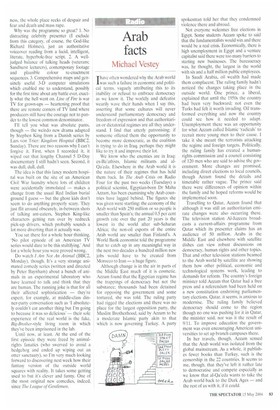Arab facts
Michael Vestey
Ihave often wondered why the Arab world was such a failure in economic and political terms, vaguely attributing this to its inability or refusal to embrace democracy as we know it. The worldly and defeatist wearily wave their hands when I say this, asserting that some cultures will never understand parliamentary democracy and freedom of expression and that authoritarian or dictatorial regimes are all they understand, I find that utterly patronising; if someone offered them the opportunity to become more democratic, as the coalition is trying to do in Iraq, perhaps they might like to try it and improve their lot.
We know who the enemies are in Iraq: ex-Ba'athists, Islamic militants and alQa'eda. Elsewhere in the Arab world it is the nature of their regimes that has held them back. In The Arab Crisis on Radio Four for the past two weeks (Tuesdays) a political scientist, Egyptian-born Dr Maha Azzam, has been examining why Arab countries have lagged behind. The figures she was given were startling; the economy of the Arab world with 250 million or so people is smaller than Spain's; the annual 0.5 per cent growth rate over the past 20 years is the lowest in the world after sub-Saharan Africa; the non-oil exports of the entire Arab world are smaller than Finland's. A World Bank economist told the programme that to catch up in any meaningful way in the next two decades a hundred million new jobs would have to be created from Morocco to Iran — a huge figure.
Although change is in the air in parts of the Middle East much of it is cosmetic. Azzam found that the Egyptian regime has the trappings of democracy but not the substance; thousands had been detained for opposing the government and some tortured, she was told. The ruling party had rigged the elections and there was no place for the largest opposition party, the Muslim Brotherhood. said by Azzam to be a moderate Islamic party akin to that which is now governing Turkey. A party spokesman told her that they condemned violence there and abroad.
Not everyone welcomes free elections M Egypt. Some students Azzam spoke to said that the fundamentalists would win and there would be a real crisis. Economically, there is high unemployment in Egypt and a venture capitalist said there were too many barriers to starting new businesses. The bureaucracy was, he thought, the largest in the world with six and a half million public employees.
In Saudi Arabia, oil wealth had made them complacent. The ruling family hadn't noticed the changes taking place in the outside world. One prince, a liberal, explained that until the 1950s the country had been very backward; not even the Turks had felt it worth invading. Oil transformed everything and now the country could see how it needed to adapt. Unemployment there was an opportunity for what Azzam called Islamic 'radicals' to recruit more young men to their cause. I take it she meant the terrorists attacking the regime and foreign targets. Politically, the ruling family has created a humanrights commission and a council consisting of 120 men who are said to advise the government. More changes are promised, including direct elections to local councils, though Azzam found the details and timetable rather vague. The prince said there were differences of opinion within the family and he hoped reforms would be implemented soon.
Travelling to Qatar, Azzam found that although it was still an authoritarian emirate changes were also occurring there. The television station Al-Jazeera broadcasts a current-affairs programme from Qatar which its presenter claims has an audience of 50 million. Arabs in the Middle East and elsewhere with satellite dishes can view robust discussions on democracy, human rights and other topics. That and other television stations beamed to the Arab world by satellite are showing them how other political, economic and technological systems work, leading to demands for reform. The country's foreign minister told Azzam that Qatar had a free press and a referendum had been held on a new constitution enshrining parliamentary elections. Qatar, it seems, is anxious to modernise. The ruling family believed democracy should come to the region though no one was pushing for it in Qatar, the minister said, nor was it the result of 9/11, To improve education the government was even encouraging American universities to set up branch campuses there.
In her travels, though, Azzam sensed that the Arab world was isolated from the global mainstream. As a whole, it publishes fewer books than Turkey, such is the censorship in the 22 countries. It seems to me, though, that they've left it rather late to democratise and compete especially as we know that al-Qa'eda wants to take the Arab world back to the Dark Ages — and the rest of us with it, if it could.


































































































 Previous page
Previous page